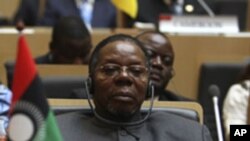Malawian President Bingu wa Mutharika has died after suffering a heart attack Thursday at his home in the capital, Lilongwe.
When Bingu wu Mutharika was elected president of Malawi in 2004, many believed he would govern as a proxy for Bakili Muluzi, the outgoing president. Muluzi had handpicked Mutharika to succeed him after he failed in his bid to serve a third term.
But soon after taking office, President Mutharika launched initiatives to combat corruption in the country. Muluzi was one of those the law enforcement agencies targeted.
The actions earned Mutharika accolades from international donors and anger from Muluzi, leading to the president abandoning the ruling United Democratic Front and forming his own party, the Democratic Progressive Party, or DPP.
The discord led to domestic instability during Mutharika’s first term, with parliament often paralyzed and the president under threat of impeachment. Even so, during those years Mutharika introduced measures that saw Malawi move from chronic food insecurity, becoming a food secure country with surpluses.
In 2009, running with current vice president Joyce Banda, Mutharika won a comfortable victory in the presidential election.
But the president refused to endorse Banda as his party’s presidential candidate in 2014, instead opting for his brother, resulting in a dispute that led to him expelling her from the DPP. Banda formed her own party but continued as vice president.
Mutharika responded to his political difficulties by introducing laws that critics such as Undule Mwakasungure, chairman of Malawi's Human Rights Consultative Committee, said curtailed democratic rights, and stifled dissent and free speech.
"We have seen the government passing undemocratic bills, the government suppressing the freedom of the press, the government threatening human rights defenders, the government suppressing the voice of Malawians," said Mwakasungure.
In the wake of the 2008 global recession, economic growth slowed, causing fuel and foreign exchange shortages that added to anger among Malawians. In July 2011 Malawians took to the streets in protest and the authorities responded harshly, killing 19 when they opened fire on crowds with live ammunition.
Mwakasungure described the police as aggressive.
"The unprofessional conduct of the police; where the police started to push people out of the central [assembly] points while people were still waiting to hear from civil society leaders on what would be the next move, so in that process people became violent, and the police also started throwing tear gas," said Mwakasungure.
In the wake of the deaths, critics said Mutharika failed to grasp the despair of his people, and refused to engage them in discussions about their concerns.
Mutharika, who was born in 1934, had a doctorate in economics and spent many years abroad working for international organizations, including the World Bank. He is survived by his second wife Callista Chapola-Chimombo and four adult children.










